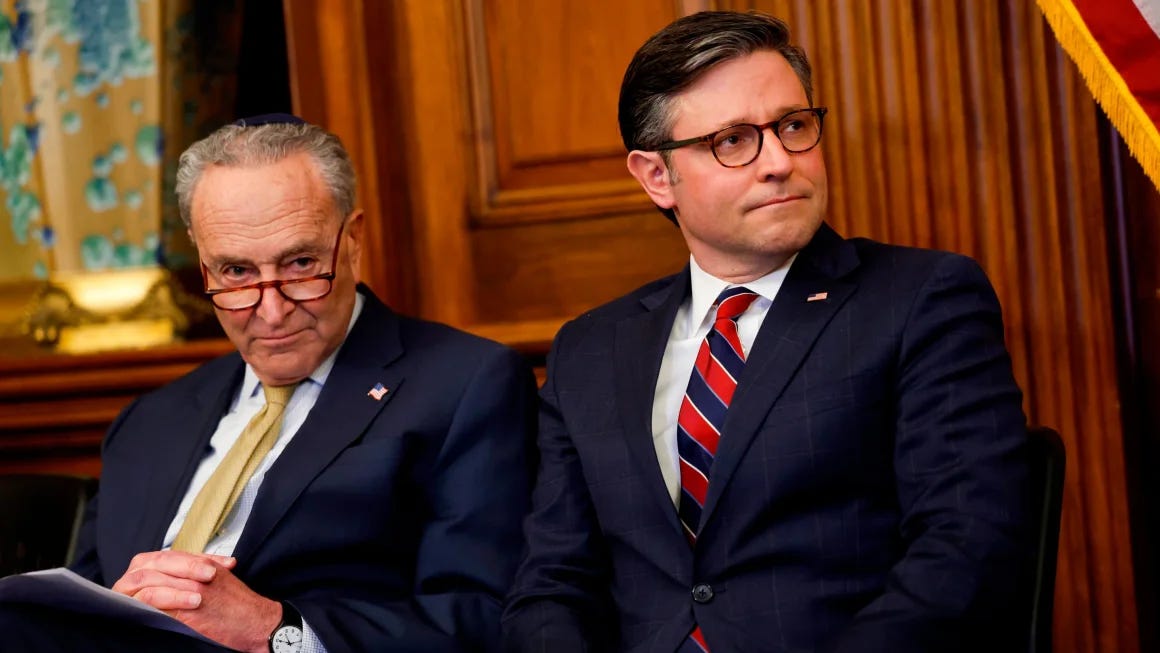What to know about the Schumer-Johnson topline funding agreement
The deal reflects the bargain President Biden and former Speaker McCarthy negotiated last year, with about $16B in additional cuts for which the new speaker can claim victory.

Ahead of the House and Senate’s return to Washington this week, Senate Majority Leader Chuck Schumer (D-N.Y.) and Speaker Mike Johnson (R-La.) announced a $1.6 trillion deal on the amount of money lawmakers can authorize to fund the federal government through the end of September, a figure known as the “topline.”
Now, House and Senate appropriators and their staff will rush to write legislative text that Schumer and Johnson can pass through their respective chambers before the first of two funding deadlines expire a week from Friday.
The agreement reflects the bones of a deal President Joe Biden and former Speaker Kevin McCarthy negotiated last May to set funding caps and raise the debt limit. It allows for $806 billion in defense funding and almost $773 billion to invest in domestic programs. The McCarthy deal capped nondefense funding at $704 billion, but Democrats notched a $69 billion side deal that effectively allows them to fund domestic programs at the current levels. House Republicans pushed to axe the side deal, so Democrats should view the fact that it remains in the final deal as as win.
Johnson claimed victory for accelerating cuts to IRS funding passed in the Inflation Reduction Act in 2022 to audit wealthy tax cheats. The Biden-McCarthy agreement called for $10 billion in cuts in 2024 and another $10 billion in 2025; now the full $20 billion will be slashed this year. Add that to the $6.1 billion in unspent COVID-19 money Johnson was able to claw back, and the speaker secured around $16 billion in cuts.
But it’s wild to think Congress passed two short-term funding extensions—one of which led House Republicans to remove McCarthy as speaker and squander a month of precious floor time while they elected Johnson to replace him—to essentially end up with the same deal that McCarthy struck with the president to avoid the mess lawmakers find themselves in.
In a joint statement, Schumer and House Minority Leader Hakeem Jeffries said the bill will protect Democratic priorities, including veterans benefits, health care and nutrition assistance.
President Biden said the agreement provides a path to full-year funding bills and should be written into law as soon as possible.
“Congressional Republicans must do their job, stop threatening to shut down the government, and fulfill their basic responsibility to fund critical domestic and national security priorities, including my supplemental request,” he added. “It’s time for them to act.”
Schumer and Jeffries agreed: “Both sides will need to work together in a bipartisan way and avoid a costly and disruptive shutdown,” they said in their statement.
But Rosa DeLauro, the top Democrat on the House Appropriations Committee, offered a sharp criticism of House Republicans for wasting the first extension in federal funding and most of the second arguing over funding levels they agreed to last year.
The Connecticut congresswoman also expressed fury at the IRS cuts and COVID-19 clawbacks, which she opposes.
With less than two weeks to write and pass the bills before a partial shutdown, Sen. Patty Murray (D-Wa.), chair of the Senate Appropriations Committee, said Congress can ill afford to delay the process any further.
“So I will be working with colleagues around the clock in the coming days to prevent a needless shutdown,” she added.
As expected, House conservatives despise the deal and accuse Speaker Johnson of failing to secure far-right policy wins.
The far-right House Freedom Caucus described it as “even worse than we thought” and “a total failure.”
Rep. Marjorie Taylor Greene (R-Ga.) said on Sunday that she would vote against government funding before the bills to codify the Schumer-Johnson agreement have even been written.
Rep. Chip Roy (R-Texas) claimed the deal surrenders the leverage in the original Biden-McCarthy agreement because it retained the so-called $69 billion side deal and indicated House conservatives would look to reattach the culture-war provisions that knocked the appropriations process off the rails in the first place.
“But the [National Defense Authorization Act] was not good preview,” Roy said of the annual defense policy bill . “As usual, we keep spending more money we don’t have.” (Although President Biden has signed off on nearly $2 trillion in federal deficit reduction in the first two years of his term, The national debt rose to a record $34 trillion last week.)
Congressional Democrats and President Biden said any poison pills would cross a red line and almost ensure a government though.
Keep this in mind: Any funding bills that clear the House will most likely be passed under suspension, which would allow House GOP leadership to skip a sure-to-fail procedural vote but require Democratic support to pass.
It’s also worth noting Senate Minority Leader Mitch McConnell (R-Ky.) expressed support for the deal. So outside of the handful of conservative rabble-rousers in his conference, Senate Republicans should be expected to publicly grouse about the particulars of the deal while ultimately supporting it.
“America faces serious national security challenges,” McConnell said in a statement posted to his official X account. “And Congress must act quickly to deliver the full-year resources this moment requires.”
Once Upon a Hill is home to thoughtful, accessible and singular coverage of congressional politics. Browse the OUAH archive for more posts and subscribe to the twice-weekly newsletter to get OUAH’s in-depth and independent journalism sent straight to your inbox.

